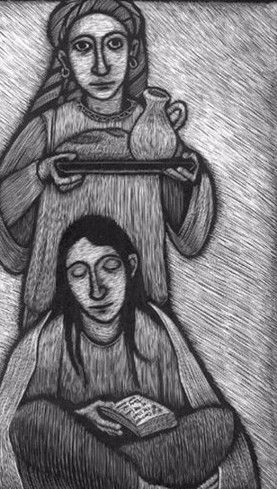THE CASE OF THE BUSY BEES
- Charles
- 19 juil. 2025
- 3 min de lecture
Reflections on the Sixteenth Sunday in Ordinary Time: Genesis 18:1-10a, Colossians 1:24-28, Luke 10:38-42

Today’s liturgy presents three “busy bees” exemplifying active service: Abraham at his tent, Paul in ministry, and Martha in her home. These whirlwinds of activity invite us to pause, take a break, and reconsider why we are running and where to.
The first reading shows “busy bee” Abraham as a model of proactive, joyful, and generous hospitality. Spotting three visitors, he runs from his tent, hurries Sarah to prepare bread, runs again to the herd to select the best calf, and instructs his servants to hurry in preparing it. Though a wealthy patriarch with servants, Abraham waits on them under the tree while they eat (v. 8). His swift, generous actions focus solely on comforting his guests. These visitors are later revealed as Yahweh (v. 13) and two angels (who proceed to Sodom in chapter 19). Abraham’s hospitality was, unknowingly, service to God Himself. His active faith is rewarded with the astonishing promise of Isaac, the son of the covenant. His busy hospitality bears fruit.
In the second reading, “busy bee” Paul describes his approach to God’s mission. His life embodies dedicated, active, even suffering service. His wilful acceptance of mission challenges is astounding. He rejoices in sufferings “for your sake.” He sees them as sharing Christ’s passion: “In my flesh I am filling up what is lacking in the afflictions of Christ.” He embraces toils for the Church’s sake. Paul’s tireless journeys, preaching, founding communities, and endurance are his joyful offering to Christ and the Church. His self-offering aims to reveal the glorious mystery: “Christ in you, the hope for glory.” His busy ministry flows from a deep calling: to present everyone perfect in Christ through the Church.
Finally, the gospel presents Martha, the “busiest bee”. Like Abraham and Paul, she is immersed in the vital and selfless work of welcoming Jesus and his disciples. She is “burdened with much serving,” striving to honour her guests through practical care. Her intentions are good, her work necessary. Yet, seeing Mary sitting at the Lord’s feet and listening to him, Martha feels overwhelmed and unsupported. She protests, asking Jesus to tell Mary to help. Jesus’ response halts her busyness: “Martha, Martha, Mary has chosen the better part”. Does Jesus dismiss Martha’s service? Absolutely not! It is a true sign of faith and love. Jesus himself came to serve.
The problem lies not in Martha’s action, but in her state of being: she is “anxious and worried about many things.” Isn’t this our problem too? Lost in busy schedules, tasks, and responsibilities, we become nervous wrecks – exhausted, stressed, anxious. Martha’s service seems driven more by duty or expectation than by first listening to what Jesus truly desired. Perhaps he visited not primarily to be served, but for fellowship and dialogue. Her well-intended hospitality distracted her from the Guest Himself. Mary, however, chose “the one thing necessary,” “the better part”: being present to the Lord, listening to his Word. In this profound encounter, Jesus reveals attentive receptivity as the foundational posture. Mary’s listening isn’t passive idleness; it’s the active receptivity of a disciple, positioning herself to receive life and direction from the Source.
Jesus reverses our usual priorities: silence over noise, listening over speaking, presence over frantic activity as the starting point. Why is this “better”? Because everything else flows from it. Without this connection to the Source, our actions, however well-intentioned, risk becoming self-driven, anxious, and disconnected from God’s deeper purpose. We risk serving an idea of God or our own agenda, rather than God Himself. Mary’s posture allows the Word to take root, transforming her from within. Any action that follows becomes an overflow of that relationship – imbued with the Spirit, aligned with God’s will, like Paul’s suffering service born of knowing “Christ in you.” The “better part” is communion with Christ, receiving the fullness of life He offers. This is the foundation Abraham’s hospitality unknowingly welcomed, and the mystery Paul laboured to reveal.
At the heart of our spiritual life, we discern this beautiful, yet challenging tension: the interplay between action and contemplation, busy service and attentive listening. Finding the balance is hard. We are scared of silence, feeling it’s unproductive, or fearing what God might say. But only by choosing the “better part,” by sitting at the Lord’s feet and listening, will our actions – our hospitality, our service, our work – truly become Spirit-filled, fruitful, and free from the anxiety that burdened Martha. Let Mary’s choice, Abraham’s hospitality, Paul’s dedication, and Martha’s intention challenge us to find the right balance between contemplation and action.




Commentaires